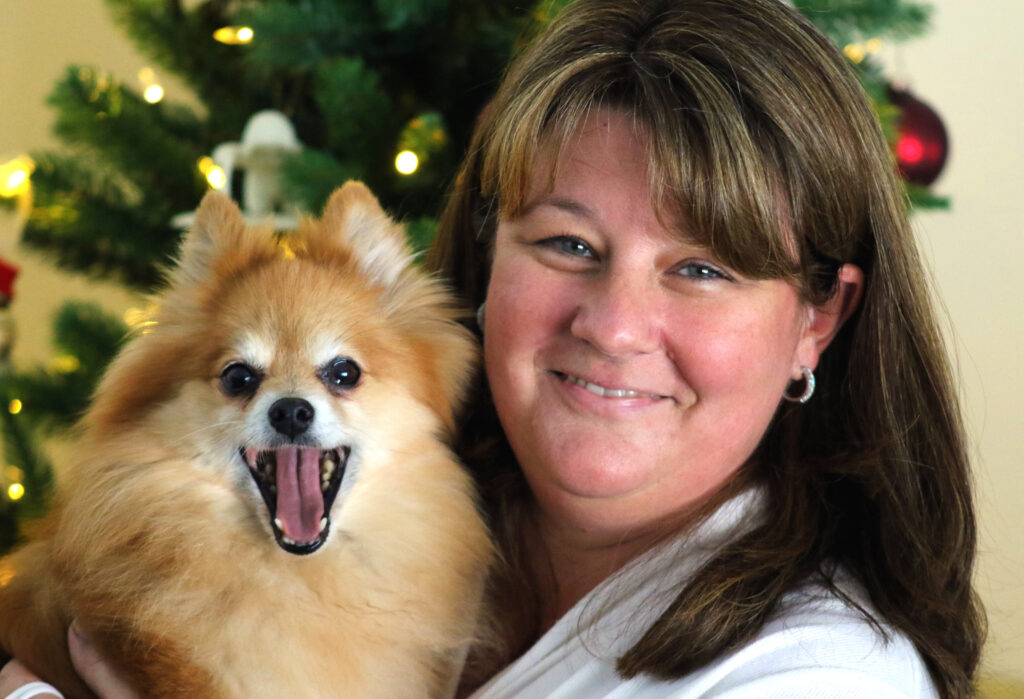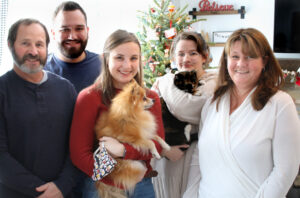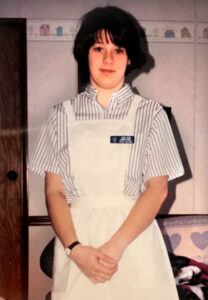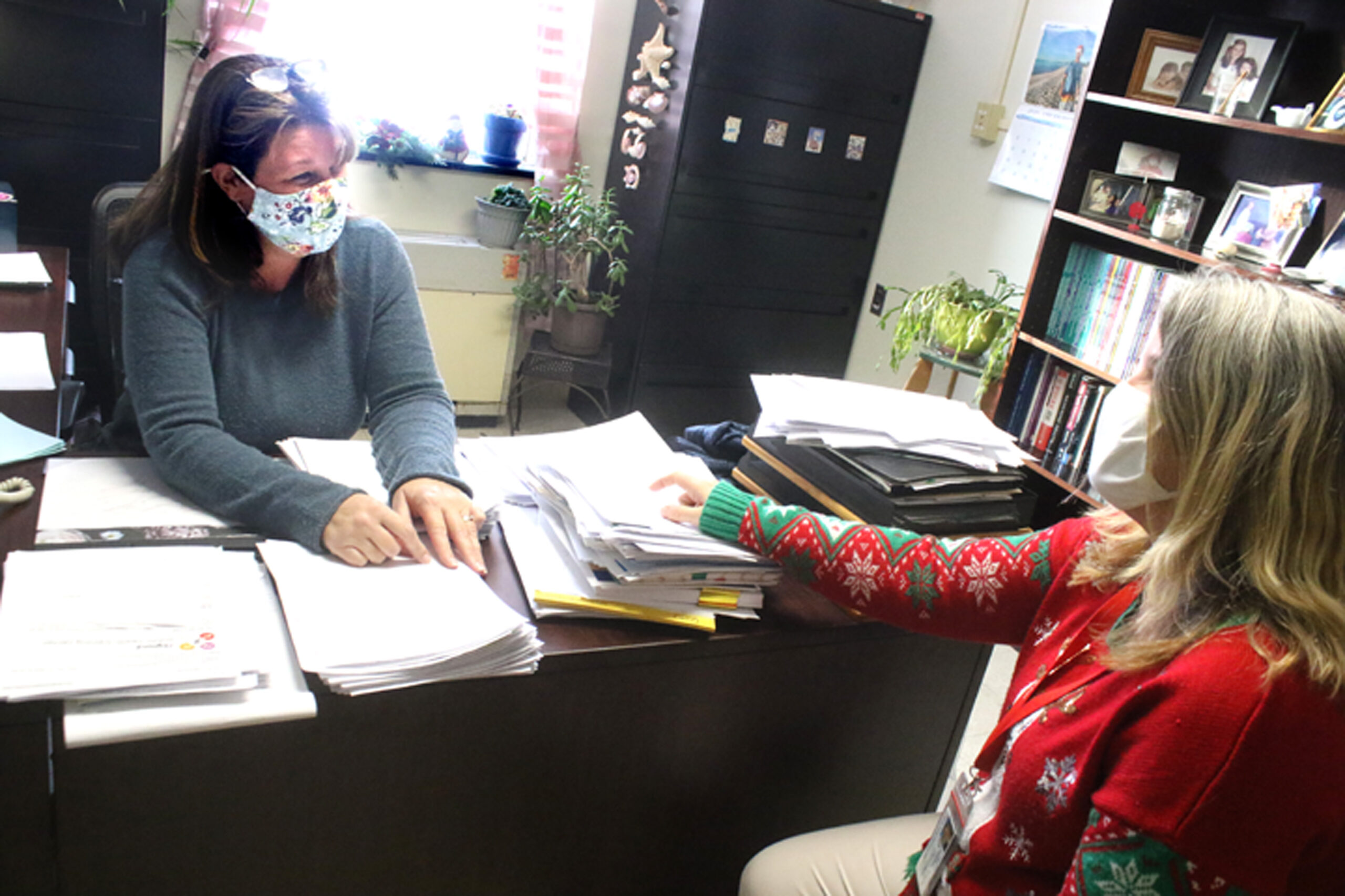2020 CITIZEN OF YEAR
General In
C-19 Fight
With 36 Years On Health Care’s
Front Lines, Heidi Bond Was Ready
By LIBBY CUDMORE • Special to www.AllOTSEGO.com

RICHFIELD SPRINGS
Thirty-four years ago, during her first summer as a nurse’s aide at Bassett Hospital, Heidi Bond’s mother, Registered Nurse Cindy Brophy, gave her advice that has carried her through her career to date.
“She told me, ‘I don’t care if you have to go cry in the bathroom every shift – you finish this summer,’” said Bond. “She had a very strong work ethic, and she instilled that in me.”
That fortitude was put to the test when the COVID-19 pandemic hit. Bond, also an R.N., has worked tirelessly, seven days a week, since the first case arrived in mid-March, assisting with contact tracing, scheduling testing clinics and monitoring the rise of the virus throughout the county.
For her steady hand and firm compassion, Otsego County Director of Public Health Heidi Bond has been named the Citizen of the Year by Hometown Oneonta, The Freeman’s Journal and www.AllOTSEGO.com.
“I know I’m proud of the work she’s done,” said Dave Bliss, R-Cooperstown/Town of Middlefield, chairman of the county Board of Representatives. “And I’m confident in saying our board is too.”
“The challenges of COVID would have caused others to curl up in the corner,” said county Rep. Andrew Stammel, D-Oneonta, who chairs the county board’s Health & Education Committee. “But not Heidi. She works diligently, confidently and without complaint.”
“She’s a phenomenal person, and I’m not just saying that because she’s my daughter,” said Brophy, now a nurse in Scarborough, Maine. “She is gentle and kind, and I don’t know if I’ve ever seen her lose her temper. Everybody loves her.”
Bond was raised in Richfield Springs, graduating from Richfield Springs Central School with the Class of 1991. Working at Bassett, her mom got her the candy striper job in 1986, when Bond was a teenager.

vitality from her
earliest days in Richfield Springs,
her mom attests.
“I really enjoyed helping people,” Bond said. “Even just things like bringing them fresh water to drink.”
The next year, she applied to be a nurse’s aide, a job that was considerably more challenging. “I didn’t think she had the stomach for it,” said her mom. “I thought she’d change one bedpan and be out of there!”
But Heidi – determined to see the summer through – found joy in the work. “She fell in love with it,” said her mother. “She would write letters and cards for the older patients if they wanted to send one. She found the work very rewarding.”
She attended Utica College’s four-year R.N. program, graduating in 1995 and returning to Bassett’s pediatric inpatient unit, providing care for children who had surgery, the flu or accidents requiring an overnight stay.
There, she learned another critical-care lesson.
“So many people told me, ‘Oh, I could never do pediatrics, I’d get too attached,’” she said. “But I got very good at separating my personal emotions from my work, and I learned how to be strong for the kids and the families.”
She married her high school sweetheart, Stephen, in 1992. The couple had their first daughter, Katie, in 1998, and the young mother switched to part-time in pediatrics so she had more time to stay home with her daughter. Daughter Emily was born in 2001.
In 2000, when Katie was 2, Bond heard about an opening for nurses at the county’s Health Department. “I enjoyed my public health classes at college,” she said.
At that point, part of public health involved home-care visits. “It’s a much different style of nursing,” she said. “In a hospital, you’re seeing a patient in a sterile environment and you have no idea what their home life is like. But in home care, you’re able to see them where they’re most comfortable.”

Christmas tree with, from left, husband Stephen, son-in-law Tom Worobey, daughter Katie Worobey and dog Molly, daughter Emily Bond and cat Kitty. (Ian Austin/AllOTSEGO.com)
Sometimes, home care involved more than just nursing. “You’d go into these places and see that they didn’t have running water or there would be holes in the floor,” she said. “When you see someone in the hospital, you never imagine they’re living that way.”
Facing her new challenge, she didn’t retreat to cry in the bathroom, either.
“You can help them get the help they need,” she said. “And sometimes, they don’t want to accept that, so you help them as much as you can with the resources they do have.”
In 2005, the county department gave up its Home Health Agency certification, switching more focus to scheduling rabies vaccinations for pets, flu-shot clinics, visits to new mothers, lead-prevention poisoning and education, and prevention of chronic diseases and injuries.
She was promoted to Communicable Disease Control director in 2004. “Before the pharmacies began offering the shot, we had to put out a clinic schedule,” she said. “One year, we got a message from the state saying there was a shortage of the vaccine, and we had to cancel all the clinics.”
“It’s funny,” she continued. “Back then, people were clamoring to get the flu vaccine. Now we have to educate people into taking the COVID vaccine. It’s a culture change – a lot of people have never had to deal with a serious communicable disease in a way that affects a whole society.”
She was appointed public health director in 2008, just one year before swine flu hit. “We did have cases,” she said. “But nowhere near as many cases of that as we do of COVID.”
Part of her new duties included pandemic preparations, such as “war games” scenarios. “When Ebola hit in 2014, we would have a practice station where we would get PPE on and off,” she said.
“We would go to hospitals and make sure they were putting it on right.”
No cases of Ebola ever arose in Otsego County. Still, those two test runs, she said, helped mentally prepare her for when she got the call in January.
“I had taken a Friday off because my daughters and I had planned to get massages,” she said. “But the state Department of Health scheduled a mandatory webinar, so I had to cancel them. That started the alarm bells ringing, and they haven’t stopped going off since.”
The first case in the county arrived in March, when a SUNY Oneonta student and his mother went on vacation to Lake Placid. “Mom was sick and the student didn’t want to quarantine with her,” Bond said. “So he returned to campus, and cases spread from there.”
From March until August, there were five deaths and 117 cases, and by June, the county seemed to have gotten the pandemic under control.
“There was a point in the summer where we went three weeks without a case,” she said. “I didn’t think it was over, but I’d tricked myself in to a complacency where I thought we could handle it.”
But the return of the college students jeopardized all of that.

A “super-spreader” party Friday, Aug. 21, SUNY Oneonta students’ first weekend back, resulted in 107 cases by the following weekend, when newly appointed SUNY Chancellor Jim Malatras made a whirlwind trip to Oneonta and cancelled classes for two weeks. When cases hit 300 a week later, he closed the campus for the remainder of the semester.
“That really opened my eyes to just how fast the virus could spread,” she said. “Even with measures in place, in congregate living, it spreads no matter what you do.”
In the months since, SUNY’s infections topped out at over 700, with Hartwick College infections totaling 71 over the semester.
Community spread from the college outbreaks was minimal, in part, thanks to rapid testing sent in by the state. But as the weather got too cold for outdoor dining and “COVID fatigue” set in, cases began to trend upward, with more than a thousand cases and 11 deaths since September.
“We have the highest number of hospitalizations we’ve had, but people just aren’t as concerned as they were in the spring,” she said.
“I know she must be frustrated, but she remains professional and always does her job,” said Bliss.
“It breaks Heidi’s heart when people aren’t wearing masks,” said Brophy. “She isn’t angry, she just really cares about people.”
Bond is in constant communication with the state Department of Health, as well as the county board. “I talk to her daily,” said Bliss. “Sometimes multiple times a day. Before this, I might talk to her once or twice a month.”
“I feel confident when we go to her with questions,” said Stammel. “She explains the answers, and if she doesn’t know, she knows who to get the answer from, and brings it back to us.”
With the arrival of the vaccine – last week, 350 Bassett employees received the Pfizer shot and more than 500 received the Moderna – and with the recent approval of funds to hire three additional nurses, Bond is finally seeing the end of the crisis nearing.
“I try to tell myself that, in the grand scheme, a year or two is not a lot of time,” she said. “But when it’s all over, we’re all planning to take a long vacation on the beach.”



So proud of my sister.
One note, she obtained a Bachelor’s degree as an RN (registered nurse), not LPN.
So very proud of Heidi I have known her most of her life. Great work, my girl! Love you.